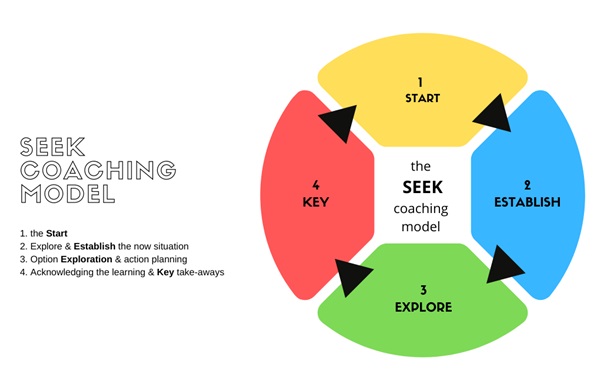A Coaching Model Created by Daren Easton
(Career Coach, HONG KONG)
Introduction
I have found whilst studying with ICA that during a coaching session, I find it immensely helpful to follow a structured approach that provides the best service for the coachee and helps them to move through the coaching session in a logical sequence towards their objectives and walk away from the session with a feeling of progress.
To aid my coaching sessions, I have created the SEEK Coaching Model which I believe provides a suitable framework without being too prescriptive or rigid. This model also reflects the way that I coach intending to ‘seek first to understand and places emphasis around establishing the coachee’s current situation and what they want to achieve. This helps them recognize where they would like to make changes and to develop actions to implement these changes to move forwards.
I find the SEEK model is useful both at the commencement of the coaching relationship in the development of the initial coaching goals and each of the coaching sessions to help move the coachee in the direction towards their overall goals.
The SEEK Coaching Model is a framework that consists of 4 key steps;
- the Start
- explore and Establish a new situation
- option Exploration and action planning
- acknowledging the learning and Key take-aways

-
the Start
The act of the coachee ‘turning up’ to the session both physically and emotionally I believe demonstrates an intent to partner in the coaching process and a willingness to do something different.
The initial greeting and introduction at the start of any coaching session is the opportunity to put the coachee at ease and to start building the trust that is critical for the session’s success. This allows them to freely express their thoughts, emotions, and vulnerability. During this initial stage, we would normally recap and review progress from our previous session, before considering the subject area for exploration of the current session.
Once the coachee has selected the subject or topic, the focus moves to explore their thoughts further and to establish clarity in their desired outcome or result from the session. It is important that the coachee’s expectations are managed from the outset and therefore an outcome needs to be established that can be achieved in the session time available.
This step also presents the chance to check the session goals to align with the overall objectives of the coaching relationship identified during the first discovery session.
There is further opportunity to explore with the coachee, the importance of the desired outcome or goal means to them and can encourage a deeper level of thought and further revelation. Having experienced the role of the coachee during peer coaching, I am constantly surprised by the impact that this question has on my participation in the remainder of the coaching session and therefore I encourage thorough exploration during my coaching sessions.
-
explore and Establish a new situation
To allow the coachee to acknowledge where they are and what they might need to do to move towards their goal, it helps the coachee to understand their current situation.
This stage seeks to establish with the coachee what their current situation looks like and what they need to address to allow them to make progress towards their desired goal or result. This stage assists the coachee by recognizing the need to adjust their ‘Now’ situation.
-
option Exploration and action planning
Once there is an understanding of what ‘now’ looks like, the coachee can start to explore potential options that will help them move closer to their goal. I try to avoid focusing too quickly on a single option and look to first explore other potential ideas and encourage brainstorming of further options. Once the client feels that they have explored this area sufficiently, they are then able to select an option or options with which to move forwards.
Actions are identified and thoroughly explored to ensure that all dependencies or inputs needed to complete the action are understood. Spending sufficient time investigating the dependencies or identifying the support necessary is critical so that realistic timeframes for their completion can be allocated and the coachee can be held accountable.
-
acknowledging the learning and Key take-aways
This final stage is all about reflection of the session. The question of learning requires the coachee to reflect on their work done or distance traveled in the session and by identifying their key takeaways from the session they should be encouraged to acknowledge themselves for the effort and outcomes that they have achieved.
References
ICA Foundation Coach – Coaching Models
Coaching for Performance: The Principles and Practice of Coaching and Leadership – Sir John Whitmore
7 Habits of Highly Effective People – Stephen Covey
https://www.personal-coaching-information.com/effective-coaching-models.html